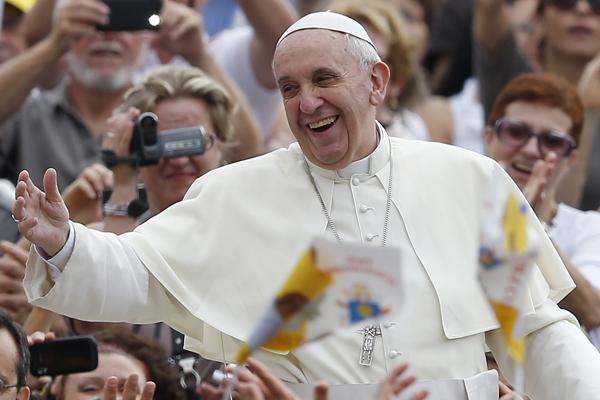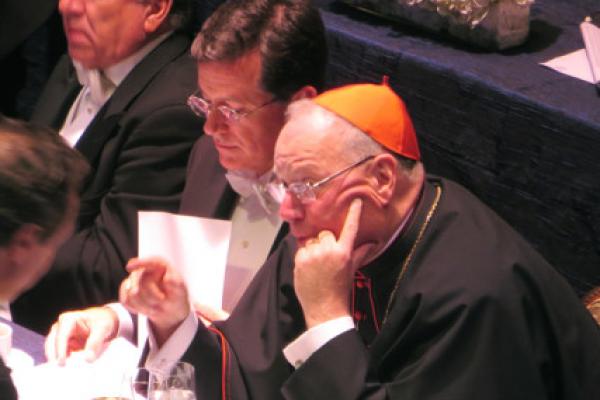Moved by the election of Pope Francis seven months ago, the name “Francesco” has leapfrogged to No. 1 on the list of the most popular baby names in Italy, according to a study.
The study, conducted by Enzo Caffarelli, who researches the origins of names at Rome’s Tor Vergata University, along with telephone directory publisher Seat PG Italia, also showed a trend toward re-naming streets, town squares, and parks for St. Francis of Assisi, the pontiff’s namesake.
The judge who declared same-sex marriage legal in New Jersey was raised a Catholic in Bayonne, a place where the locals still use their church — not their neighborhood — to define where they’re from.
Judge Mary Jacobson graduated in 1971 from Holy Family Academy, a since-shuttered all-girls Catholic high school near her home.
“In Bayonne, you identified yourself by your parish,” said Thomas Olivieri, a retired Superior Court judge in Hudson County and a Bayonne native. “Mary’s family was from St. Mary’s parish. Ours was from St. Vinny’s. We’re both very proud of where we came from.”
The great and the good — and lots of politicians and TV pundits, too — gathered Thursday to hear comedian Stephen Colbert roast and toast everyone from Pope Francis to his host for the evening, Cardinal Timothy Dolan.
The 68th annual Al Smith Dinner, named for the first Catholic presidential candidate in American history, at the Waldorf Astoria hotel raised $3 million for New York’s neediest children.
Colbert is a lifelong Catholic, a man who is, as Alfred E. Smith IV said in introducing him, “serious about both his craft and his Catholic faith.” The cardinal — who is also pretty funny — and the comedian first met last fall, and Colbert had Dolan on his show last month. So the archbishop of New York returned the favor by having Colbert headline the dinner.
In the Bible, few dine alone.
Small wonder that Christians and Jews see sharing a meal with family, guests, and strangers as a form of spiritual nourishment and hospitality — as valuable as the bread passed around the table.
Although the holiday season’s family feasts are fast approaching, many say it’s the weekly family meal that matters most across time.
My child ate today. Breakfast was pancakes and sausage.
Walking to school I said, “If you don’t like the leftover hamburger that I put in your lunchbox, just buy something from the cafeteria. You have plenty of money in your account.”
Tonight we will have tacos, but if I am too tired to cook, we will order pizza.
I am grateful that I can feed my child every day.
Skeptics might say that as a perimenopausal woman with a teenage daughter, I’m apt to cry at the slightest provocation, which may be true. But I believe something different happens when we expose our vulnerabilities in a community of faith.
A close friend told me her theory that we are being “seasoned” in church each week, preparing to be broken open in ways we cannot anticipate. So we pray the liturgy, sing the hymns, go through the motions. Yet this seasoning of our spirits prepares us to be tender-hearted, open to prayer working on us.
This makes sense to me. There are so few places where we can bring our raw emotions without a self-conscious need to explain or escape to the nearest bathroom, which happens when we get teary-eyed at work or in line at Home Depot. Perhaps church is one of those last safe havens, where we can cry in public for no reason.
Occurrences of oil spills in several states have garnered little media attention in the last few years. In some cases, prompt reports are recorded, yet in others, days have gone by before the authorities are alerted and the spill becomes public knowledge.
The most recent episode happened Oct. 15, in Port of Long Beach, Calif. Upon discovery of an oil leak, Exxon Mobil announced that it was temporarily suspending operations of its pipeline system. The pipeline, which connects to the company’s refinery in Torrance, carries up to 155,000 barrels of oil per day. Exxon filed documents with the California Emergency Management Agency that claimed the leak did not affect waterways, although the company was ordered to pay a $236 million fine for contaminating groundwater in New Hampshire this past April.
Another spill was initially discovered on Sept. 29 by North Dakota farmer Steve Jensen, the Associated Press reported. While harvesting wheat, Jensen discovered the leak in his field “spewing and bubbling 6 inches high.” The rupture was a break in Tesoro Corporation’s underground pipeline. While it remains unconfirmed, early evidence cites that corrosion on the 20-year-old pipeline is the cause of rupture. At least 20,600 barrels of oil flooded the 7-acre spill zone, equal to about 7 football fields.
The delay in making public North Dakota’s oil spill proves as worrisome as the spill itself. It took 11 days after the spill’s discovery for it to become public knowledge. Officials claim they were not aware how extensive the spill was, but critics point to the state’s financial benefits in the recent gas and oil boom as reason for the authorities’ hesitancy in coming down on oil companies. But economic incentives shouldn’t diminish the serious need to weigh environmental risks and costs.
The cases begin to pile up.
What do you do with critical information on intractable justice issues when reputation, methods, or prevailing propaganda make it difficult for people to believe the truth? How does one find ways to strengthen the fragile line between democracy and the lurking dark social disorder? Limiting or reversing anarchy in the U.S. and abroad may depend on finding ways to persuade and protect the common good.
A current question is in regard to the 20-year Oslo peace process (which was to be completed with separate States after 5 years). When it failed, its successor peace plans promised to bring flourishing democracy and a just peace that would hold back the winds of war and be good for Israelis as well as Palestinians.
The strategy of negotiations with prolonged periods of stalling has only widened the occupation and allowed Israel to strengthen its hold on Palestinian property. It has been conquest by a 1,000 cuts on people (1,500 Israelis and 15,000 Palestinians dead), as well as uprooted trees and bulldozed property. Less than 10 percent of 1967 war land area of Palestine is fully controlled by the Palestinian Authority. It is as though a volcanic cloud blocks the sun. Even with Secretary of State John Kerry’s vigorous efforts to diminish the rumblings and forestall an eruption, those who assure us there are signs of hope declare time is growing mercilessly short.







